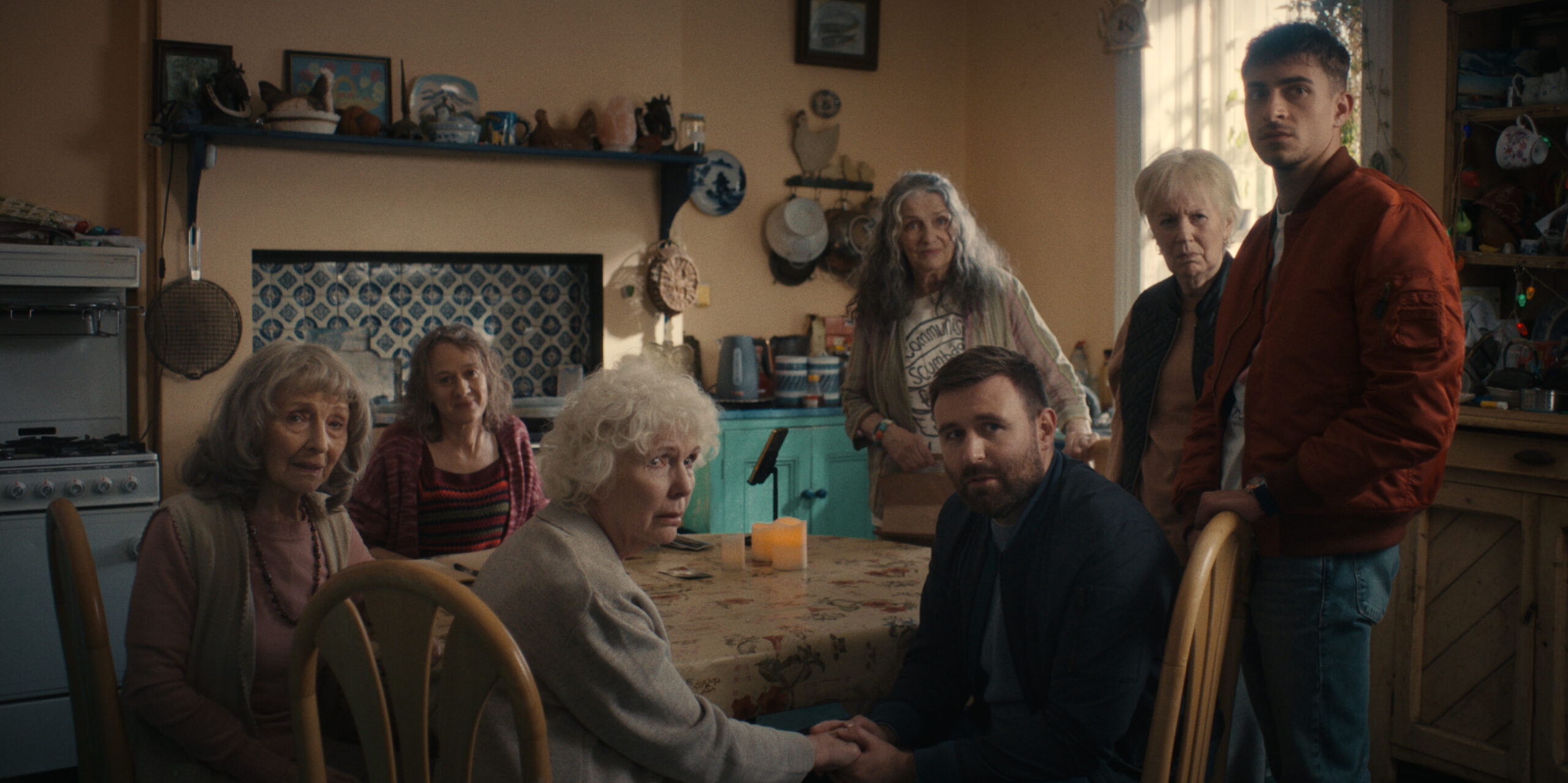There’s a stereotype about Irish mammies. Domineering. Nobody is good enough for their boys. And, oh their boys! They stay exactly that: boys. Writer / director Darren Thornton plays up to this trope for his second feature length film, Four Mothers, whilst using it as a conduit to exploring deeper topics such as loneliness, self-esteem and the building of a community.
Edward Brady (James McArdle) is a struggling novelist who is suddenly seeing a taste of success, thanks to his novel being picked up in the US. But while he tries to build on the momentum, he is also tasked with looking after his elderly mother, Alma (Fionnula Flanagan), who has been rendered mute by a stroke. On the brink of agreeing to a book tour, he finds himself not only responsible for his own mother, but those of three of his friends, leading to a chaotic but meaningful weekend of discovery.
Alma’s house is the classically old-fashioned browns and taupes of yesteryear. Heavy curtains, fussy tablecloths and dark wooden furniture that probably hasn’t ever moved take up the space. The kitchen tiles and the frilly accessories are dated but cosy. It’s a house that feels so utterly familiar. The burden of care may feel heavy for Edward and his friends, but the alternative is a place that feels sterile and strange.

One of the most striking things about this film is Edward’s barely concealable anxieties. He is constantly rehearsing conversations in his head – be they with his mother, his publisher or his podcast host – or writing them down on post-its. There’s a tension that McArdle brings to his physicality. “This is the universe taking a shit on me because I even thought about doing something selfish,” he says, years of guilt rolling off his tongue. Everyone wants a piece of Edward, but we rarely get to hear him express his own wants and needs. His ‘keep sweet’ approach rarely falters (except one particularly hilarious scream into a throw pillow) and it’s to his own detriment. What life does he have beyond the daily routine of making breakfast and ushering his mother to church? It’s an emotionally intelligent performance that allows us to sympathise with his insecurities and the chaos he finds himself in.
And Darren Thornton really does bring the chaos. As the camera pans down four sets of pursed lips – truly, only Irish mothers can look so unimpressed – we realise that Edward is in for a hard time. They all wander about the house; demanding different breakfasts or activities or to be taken to hospital appointments. Bells are rung for attention; Alma’s text-to-speech app constantly yells for Edward in the most dispassionate way possible. Bad reviews of his novel are read aloud for all to hear. No wonder Edward is a collection of neurosis.
But beyond all of this, we get to understand each of the women’s circumstances. They are all widowed; bound to some outdated notion that marriage should be bruising and life is simply unfair. Dearbhla Molloy’s Jean, in particular, is an interesting watch. “Was it the N or the O that confused you?” she challenges Edward. She sneaks out the house, refuses to use her walker and enjoys a spot of drunken karaoke at a local pub. Paddy Glynn’s Rosey has an Albanian boyfriend who she video calls whilst Stella McCusker’s Maude can’t stop gatecrashing funerals. Fionnula Flanagan does a fantastic job of realising her character through eye rolls or mournful sighs. None of them want to get old because the reliance on others feels cruel. There is a loneliness in both being the carer and being cared for. Whilst Edward displays constant indecisiveness and people pleasing, these women are desperate for their agency back.

As the film progresses, Thornton underlines how important community is. Edward cannot do this on his own; these four mothers cannot live their lives in siloes either. It’s about building networks of support so that, when you need to focus on your own needs, you aren’t riddled with feelings of selfishness. There’s also a real tenderness in the relationships that are ever-so-gently established, here. As Alma grasps her son’s hand whilst they wait at a set of traffic lights, you understand that her burden is as great as his. Whilst the women all seem sharp and bossy and unfeeling, they do care about how their needs impact the lives of their children. (Even if there are an awful lot of last minute agenda changes and road trips.)
There’s a warmth in Four Mothers that, if you’ve grown up in an Irish community, is instantly recognisable. Razor-laced-wit is bundled up in genuine love and adoration; anxiety and guilt are just part and parcel of the experience. A very enjoyable watch made authentic by excellent performances.
Four Mothers has its Scottish premiere at the Glasgow Film Festival and will be released in UK & Irish cinemas on April 4.
- Sinners – Review - April 19, 2025
- Glasgow Film Festival celebrates its 21st edition with over 33,000 attendances - March 25, 2025
- The Return – Review from Glasgow Film Festival - March 9, 2025




